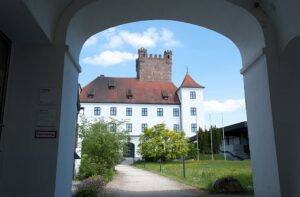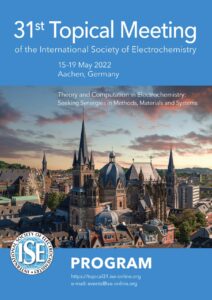Computational modelling of batteries:
First-principles quantum chemistry meets continuum approaches
Castle Reisensburg near Ulm/Germany
October 23 – 26, 2022
Description of the Event
Due to the importance of electrochemical energy storage for our future sustainable supply of energy, worldwide there are constantly increasing research and development activities with respect to secondary, i.e. rechargeable batteries. Still, due to the complexity of batteries, our fundamental understanding of structures and processes in batteries is to large extent still rather limited. In many areas of science, theoretical and computational modelling plays an increasingly important role, also in the field of battery research. Hence, a close collaboration between experimental and theoretical researchers can be very beneficial. However, from a theoretical and computational point of view, the modelling of batteries is rather challenging due to the complexity of the structures and processes present in the anode, electrolyte, and cathode of batteries and at their interfaces.
In addition, the relevant processes in batteries occur at a wide range of length and time scales, from the nanometer and picosecond scale with respect to the elementary atomic processes upon charge and discharge up to the centimeter and year scale with respect to the operation of batteries and aging and degradation processes. The modelling of structures and processes at these vastly different scales requires rather different theoretical and numerical methods, from quantum chemistry methods on the atomic scale to continuum models on the macroscopic scale. Still, the processes at the different scales are strongly interrelated. For example, any long-term degradation process is initiated and thus based on chemical processes on the atomic scale.
Unfortunately, the scientific communities performing battery modelling at the atomistic and the macroscopic length scale are rather disjunct. Hence it was the goal of the workshop on “Computational modelling of batteries: First-principles quantum chemistry meets continuum approaches” at Castle Reisensburg near Ulm from October 23 to 26, 2022, to bring together world-leading experts of both communities. The first aim was to foster the exchange between the two communities to create an awareness of the theoretical and numerical challenges of the other field. Secondly and almost more importantly, the workshop was intended to inspire collaborations between researchers of both communities in order to allow a holistic theoretical and numerical description of structures and processes from the atomistic to the macroscopic scale.
This workshop was organized by Axel Groß of Ulm University and Arnulf Latz of the Helmholtz Institute Ulm for Electrochemical Energy Storage. Both are also PIs at the Cluster of Excellence POLiS – Post-Li Storage. This workshop was generously supported by the German Science Foundation (DFG), the Cluster of Excellence POLiS, and by the Psi-k Network for electronic structure calculations of complex processes in materials. Continue reading Computational modelling of batteries: First-principles quantum chemistry meets continuum approaches



